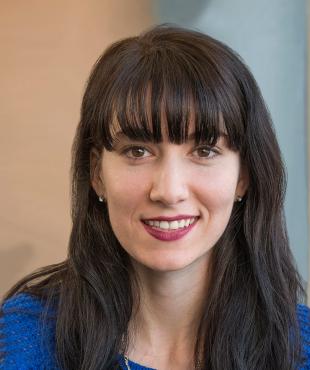
Bria Berger
Working with award-winning faculty towards a full-time career supporting HIV positive adults
Bria Berger was part of Alida Bouris’ ten-student Research team for her study, project READY (Resisting, Empowering, Advocating for Youth), which is working to answer the research question, "What are the familial and social-contextual factors associated with preventing HIV among African-American And Latino same-gender-loving young men and transgender women ages 13-19?”
To learn more about the factors that promote resilience, Project READY is surveying 150 youth about topics such as parent-adolescent communication, substance use, mental and sexual health, and their experiences with school, discrimination and the criminal justice system. Berger and other members of the team set up booths at public events such as Lakeview’s Market Days in Chicago, where they pass out literature, recruit and survey research participants, and conduct rapid HIV testing. The team has also collaborated with the Night Ministry, setting up a booth in parking lots to recruit and survey participants and to disseminate HIV/STI prevention information to teens and others who may be facing homelessness. Bria has also completed literature reviews and manages and analyzes survey data for Project READY.
Bria explains that there is a great need to reach out to adolescents about HIV prevention because it is not currently on the public’s radar. Rates are rising among certain populations: young African-American and Latina/o gay men and transgender women are particularly at risk, but so are other groups—heterosexual African-American women face much higher risk than white women, for example. In Project READY, approximately 14 percent of the sample to date has tested positive for HIV.
A combined Clinical and Administration student, Bria came to Crown Family School with a bachelor’s in social work from Michigan State. She was attracted to Crown Family School’s flexibility and opted to design her own program. “I also wanted to be in a city like Chicago that had a strong community of advocates,” she says. Bria learned about Bouris and her classes before applying to Crown Family School. She approached Bouris about working on her research team after Bria was placed during her first quarter in Bouris’ core class, Social Intervention: Direct Practice.
Bria’s first-year field placement was at Inspiration Corporation in the Woodlawn neighborhood. There, she ran a group and met with people individually to counsel them on harm reduction. “Working on the South Side of Chicago helped me to acclimate to the city,” she says.
These experiences helped when Bria worked with Bouris on South Side Stories (southsidestories.org), a project where African-American teens participate in a workshop to create a digital story about their life. Digital stories are brief videos that integrate narrative, music, and images to relate important life experiences. The project has collected stories from youth on topics such as family and romantic relationships, coming out, and segregation and violence in Chicago. Bria has conducted focus groups asking youth about their experience in the workshops and what it was like to have a platform to share their stories.
The results were positive: Many of the teens said creating their video was a transformative experience. Bria believes that her experience with Bouris, in addition to her second-year field placement at Chicago House and Social Service Agency—where her work includes program development, group facilitation and community engagement in an employment program for HIV-positive and transgender clients—puts her in good stead for an administrative role in an agency someday.
“I’ve already used many of the research skills I’ve gained with Alida at my placement at Chicago House, and I’m really excited to continue to use and expand on my research experience in social service agencies,” she says. “It’s important to have transferable skills and to have a professional mentor. Working with Alida has helped me both personally and professionally. She has encouraged me to mold my course schedule and placement to my interest and goals, to take risks, and she has helped me shape my vision of who I am in the social work world.”
Bouris also helped Bria present her undergraduate research paper at the Society for Social Work and Research conference in January of 2013. “It’s been incredible to work with Alida for almost two years now because she’s so knowledgeable about clinical practice and research, and she really loves working with students. She has worked with and cares deeply about young people and their families, and she’s incredibly dedicated to this work, including going out in the field at 10 p.m. with her research assistants to facilitate surveys with participants.”
Bria now works full-time at Chicago House with HIV-positive adults.